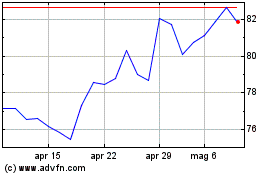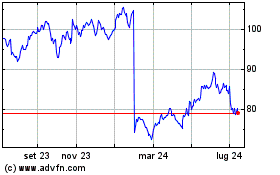International Sustainable Food Barometer (2nd edition) - Inform and Inspire: Two Global Levers Driven by Sodexo to Accelerate a Transition toward Sustainable Food
14 Novembre 2024 - 8:00AM
UK Regulatory
International Sustainable Food Barometer (2nd edition) - Inform and
Inspire: Two Global Levers Driven by Sodexo to Accelerate a
Transition toward Sustainable Food
International Sustainable Food Barometer (2nd
edition)
Inform and Inspire: Two Global Levers Driven by Sodexo to
Accelerate a Transition toward Sustainable Food
Issy-les-Moulineaux, 14 November 2024
A Barometer supporting a Global Transition toward Sustainable
Food
Sodexo unveils the results of the second edition of the
International Sustainable Food Barometer1,
in partnership with Toluna Harris Interactive. The purpose of this
Barometer is to identify the barriers
and concrete levers to change eating habits and accelerate the
shift toward more sustainable food.
Sophie Bellon, Chairwoman of Sodexo’s Board of
Directors and Chief Executive Officer said: “This
second edition of the Sustainable Food Barometer strengthens our
convictions and reinforces our commitments. It confirms that most
individuals are willing to embrace more sustainable eating habits.
It also reveals how much they rely on the Food Service sector and
chefs to help them do so! Finally, and perhaps most importantly, it
highlights the pressing need to bring together the concepts of
pleasure and health, which are too often viewed as opposing
forces.”
The 3 Key Takeaways of the Barometer
First key takeaway: sustainable food generates
widespread enthusiasm, although it is more measured in Western
countries due to the inflationary economic context.
- Citizens have a very positive view of sustainable food in
all countries: 74% of them perceive it positively or very
positively. However, this enthusiasm tends to wane in Western
countries due to the inflationary economic context. The
Barometer highlights a gap between the very positive perception of
sustainable food in "New World" countries (with nearly two-thirds
of Brazilians and Indians holding this view) and a more moderate
enthusiasm in "Western countries," where only 20 to 30% of citizens
have a "very positive" perception of sustainable food.
- For two-thirds of consumers, sustainable food contributes to
improving quality of life:
It is seen as healthier and more balanced, with 47% perceiving it
as beneficial to health.
Its positive impact on the environment (51%) and the protection of
biodiversity (43%) is also widely recognized.
Second key takeaway: price, taste, and health are the
three key factors most likely to encourage all consumers to adopt
sustainable eating habits, regardless of their interest in the
topic.
- The Barometer identifies three main consumer profiles when it
comes to sustainable food:
- 42% are "Committed", who consume sustainable products
whenever possible.
- 44% are "Undecided", who are hesitant to choose
sustainable products even when available.
- 14% are "Distant", who have no intention of consuming
more sustainable products.
- For all consumers, price remains the number one factor in
choosing food products (73% place it among their top five
criteria), far ahead of environmental concerns (27%).
- For all three groups, taste ranks just behind price as a key
factor in making food choices. Health also emerges as a crucial
element: nutritional value and product composition are the third
and fourth most important factors in the decision-making
process.
- The risk of losing taste and flavor is the main barrier
of transitioning to sustainable food.
- 47% of the Committed, 68% of the Undecided, and 70% of the
Distant consumers are not willing to consume a sustainable product
if it is less tasty than a regular product.
- The price barrier is also significant: 37% of the Committed,
62% of the Undecided, and 69% of the Distant consumers are not
willing to consume a sustainable product if it is more
expensive.
Focus on meat consumption
Contrary to popular belief, the most “Committed” citizens
consume meat almost as often as the "Undecided" and "Distant"
groups. However, the "Committed" are more likely to consider
reducing their consumption or have already started doing so,
particularly when it comes to red meat (86%). |
Third key takeaway: for consumers, Food Service
providers are key drivers of the transition toward more sustainable
eating habits.
1. A strong need for inspiration and information expressed by
consumers.
- Behind farmers (43%) and the food industry (38%), Food
Service providers are expected by citizens to play a leading
role in the transition to more sustainable eating habits (an
increase of 8 percentage points compared to 2023);
- A strong need for inspiration emerges from the study: 47% of
the Committed and 40% of the Undecided believe that sharing recipe
ideas with sustainable products or offering cooking tips would help
them change their individual practices.
- Furthermore, 46% of the Committed and 37% of the
Undecided consider it necessary to highlight nutritional
information more prominently on products and dishes.
For Carole Galissant, Director of Food Transition and Nutrition
at Sodexo France: "Consumers are ready to change their
eating habits, but they need support to achieve this.
This is precisely where Food Service providers have a key role to
play. It is our role to introduce lesser-known ingredients and
offer recipes that are both tasty and responsible, encouraging
people to adopt a more sustainable diet! In this regard, our chefs
will be the catalysts for change."
2. The 4 main areas where Food Service providers are expected
to accelerate the transition toward more sustainable eating
habits:
- Reducing food waste is a priority for 50% of citizens
(an increase of 2 percentage points compared to 2023).
- Responsible production practices are now essential: 41%
of citizens believe that Food Service providers should prioritize
sourcing local food products, and 40% believe they should
focus on products from agricultural practices that are more
environmentally friendly.
- Chefs’ creativity and the originality of the recipes
offered are key drivers for 37% of respondents.
- Informing citizens is a responsibility that Food Service
providers must take on, according to over a third of
respondents
Sodexo’s commitment to progress
As a key player in the Food Service industry and a long-standing
advocate of responsible growth, Sodexo is a unique observer of
evolving consumer behaviours, expectations, and aspirations, thanks
to its presence in 45 countries serving 80 million consumers each
day. Sodexo's ambition is to positively influence consumer choices
and mobilize the entire ecosystem to accelerate the food
transition. The adoption of sustainable food practices is more
urgent than ever. This Barometer highlights concrete levers to
significantly transform consumers' eating habits.
Sodexo aims to continue leveraging these drivers through
concrete initiatives to accelerate the shift towards more
sustainable eating habits and reduce its emissions across its
entire value chain, from field to plate.
- Inspiring through the creativity of chefs: As the
Barometer reveals, recipes play a key role in the ongoing
transition. Sodexo trains its chefs and teams to create new
plant-based dishes that inspire and entice consumers through its
brands such as Modern Recipe, Good Eating Company, and Fooditude.
The goal is to support more responsible food choices while making
pleasure and indulgence accessible to everyone.
- Providing information about products through effective
digital solutions such as the Everyday app, which displays the
environmental impact of the dishes offered and guides consumers.
Tools like Power Pricing and Product Swap help integrate
environmental criteria into the product selection and pricing
policies for the products offered to consumers.
- Reducing food waste: Through the rollout of the
WasteWatch program, which will be implemented at nearly 77% of its
sites by 2024, Sodexo aims to cut food waste in its operations
by half by next year.
- Promoting local food products and sustainable agricultural
practices, supporting its suppliers in reducing their carbon
emissions, and mobilizing its entire ecosystem to create a positive
environmental impact.
About Sodexo
Founded in Marseille in 1966 by Pierre Bellon, Sodexo is the
global leader in sustainable food and valued experiences at every
moment in life: learn, work, heal and play. The Group stands out
for its independence, its founding family shareholding and its
responsible business model. Thanks to its two activities of Food
and Facilities Management Services, Sodexo meets all the challenges
of everyday life with a dual goal: to improve the quality of life
of our employees and those we serve, and contribute to the
economic, social and environmental progress in the communities
where we operate. For Sodexo, growth and social commitment go hand
in hand. Our purpose is to create a better everyday for everyone to
build a better life for all.
Sodexo is included in the CAC Next 20, Bloomberg France 40, CAC 40
ESG, CAC SBT 1.5, FTSE 4 Good and DJSI indices.
Sodexo Key figures
- 23.8 billion euros in Fiscal 2024 consolidated revenues
- 423,000 employees as at August 31,2024
- #1 France-based private employer worldwide
|
- 45 countries
- 80 million consumers served daily
- 11.2 billion euros in market capitalization
(as at October 23, 2024)
|
About Toluna Harris Interactive
Toluna Harris Interactive is a leading global research and
insights provider that empowers clients to make smarter data-driven
decisions. Combining our flexible platform, cutting-edge
technology, expansive portfolio, and passionate experts, we
simplify our clients’ work and enable them to deliver greater
business impact. With over 75 offices across the globe, we are
delivering research in 100+ countries to the world’s leading
brands.
1 A study carried out in July 2024 with over 7,000
people in Brazil, France, India, the United Kingdom and the United
States. All the results are online on our website
www.sodexo.com
- PR Sodexo - 2024 Sustainable Food Barometer - 14.11.2024


Grafico Azioni Sodexo (EU:SW)
Storico
Da Dic 2024 a Gen 2025

Grafico Azioni Sodexo (EU:SW)
Storico
Da Gen 2024 a Gen 2025
